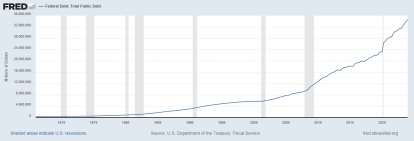The failure of bidenomics
The national debt exceeds $35 trillion for the first time
The policy of uncontrolled spending condemns citizens, with each American now owing $104,000.

U.S. dollars
The total public debt of the United States broke records by exceeding $35 trillion dollars for the first time, continuing its upward trend due to the economic policy -bidenomics- of the federal government, which leaves a dark outlook for the future in the face of unrestrained indebtedness and its implications for the nation's economy.
It was last Friday when the total outstanding public debt surpassed the $35 trillion threshold; as reported Monday by the Treasury Department.

Evolution of fedeal debt
Just seven months ago, at the end of December 2023, the national debt exceeded $34 trillion. Three months earlier, in September, the United States reached a negative historical milestone by surpassing $33 trillion in outstanding debt.
The national debt, unchecked: more than $100,000 per citizen.
Four decades ago, the national debt did not even reach $1 trillion. During this time it has skyrocketed until the debt of each U.S. citizen is close to $104,000 (according to Census data, there are 336 million inhabitants in the United States).
Against this backdrop, and amid runaway spending levels, the debt is expected to continue to grow over the next decade. According to the Congressional Budget Office forecasts, the public debt will increase 17 points during this period, going from 99% of Gross Domestic Product (Gross Domestic Product -GDP- in English- ) at the end of 2024; to 116% of GDP in 10 years.
RECOMMENDATION























